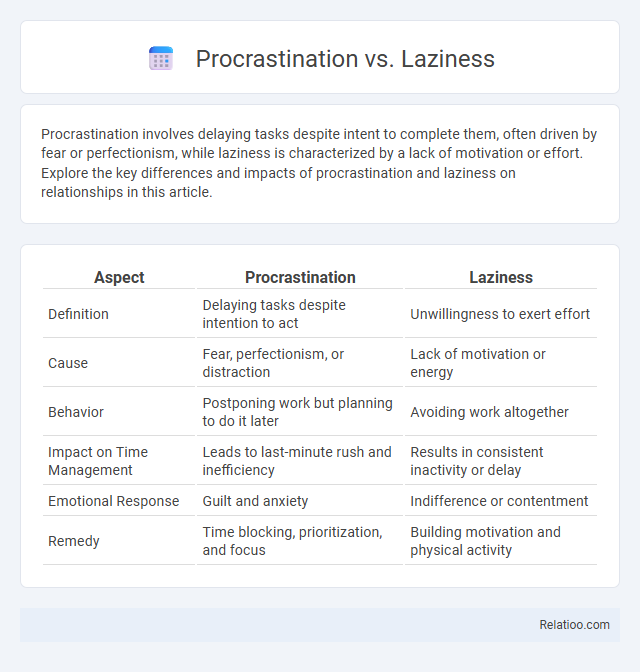Procrastination involves delaying tasks despite intent to complete them, often driven by fear or perfectionism, while laziness is characterized by a lack of motivation or effort. Explore the key differences and impacts of procrastination and laziness on relationships in this article.
Table of Comparison
| Aspect | Procrastination | Laziness |
|---|---|---|
| Definition | Delaying tasks despite intention to act | Unwillingness to exert effort |
| Cause | Fear, perfectionism, or distraction | Lack of motivation or energy |
| Behavior | Postponing work but planning to do it later | Avoiding work altogether |
| Impact on Time Management | Leads to last-minute rush and inefficiency | Results in consistent inactivity or delay |
| Emotional Response | Guilt and anxiety | Indifference or contentment |
| Remedy | Time blocking, prioritization, and focus | Building motivation and physical activity |
Understanding Procrastination: Definition and Causes
Procrastination involves delaying tasks despite knowing the negative consequences, differentiating it from laziness, which is a lack of willingness to act, and mere distraction, which is unintentional delay. Your understanding of procrastination should focus on its roots in fear of failure, perfectionism, and difficulty managing time or emotions. Identifying these causes allows targeted strategies to overcome procrastination and improve productivity.
What is Laziness? Core Traits Explained
Laziness is characterized by an unwillingness to expend effort or energy, often leading to avoidance of tasks regardless of their importance. Core traits include chronic inactivity, lack of motivation, and a preference for comfort over productivity. Differentiating laziness from procrastination helps you recognize when inaction stems from disinterest rather than strategic delay.
Psychological Differences: Procrastination vs Laziness
Procrastination involves delaying tasks despite knowing the consequences, often driven by fear of failure or perfectionism, while laziness reflects a lack of motivation or desire to act. Psychologically, procrastinators experience internal conflict and stress, seeking avoidance of discomfort, whereas laziness stems from a reduced willingness to expend effort. Understanding these differences can help you develop targeted strategies to improve productivity and mental well-being.
Common Misconceptions: Are They the Same?
Procrastination, laziness, and delay are often confused but have distinct differences essential for understanding your productivity challenges. Procrastination involves voluntarily delaying tasks despite potential negative consequences, while laziness reflects an aversion to exerting effort or motivation. Delay simply refers to a pause or postponement that might be intentional or unavoidable, unlike procrastination, which is characterized by avoidance despite awareness of the need to act.
Signs of Procrastination: How to Identify
Signs of procrastination include frequent delays in starting tasks despite knowing their importance, persistent feelings of anxiety about deadlines, and a tendency to engage in low-priority activities to avoid challenging work. Unlike laziness, which involves a lack of desire to exert effort, procrastination is often driven by fear of failure or perfectionism. Recognizing these behaviors can help you address your productivity obstacles effectively.
Signs of Laziness: Distinguishing Characteristics
Laziness is often marked by a persistent lack of motivation and an unwillingness to exert effort, even when tasks are straightforward and necessary. You may notice prolonged inactivity, avoidance of responsibilities, and a tendency to choose comfort over productivity without the anxiety or stress typical of procrastination. Recognizing these signs can help differentiate laziness from procrastination, where delay is driven by fear or perfectionism rather than a simple resistance to work.
Impact on Productivity and Daily Life
Procrastination delays important tasks despite knowing their significance, leading to increased stress and reduced productivity, while laziness involves a lack of motivation and effort, causing consistent underperformance and missed opportunities. Understanding the differences helps you implement targeted strategies to improve time management and maintain focus throughout your day. Recognizing these behaviors' distinct impacts on your daily life enables more effective self-discipline and goal achievement.
Overcoming Procrastination: Effective Strategies
Overcoming procrastination requires identifying the root causes, such as fear of failure, perfectionism, or lack of motivation, which differ from laziness characterized by general unwillingness to act. Effective strategies include breaking tasks into smaller, manageable steps, setting specific deadlines, and using techniques like the Pomodoro method to maintain focus and productivity. Developing habits like prioritizing tasks, minimizing distractions, and reinforcing positive outcomes can significantly reduce procrastination and improve task completion.
Battling Laziness: Motivational Techniques
Battling laziness requires targeted motivational techniques such as setting clear, achievable goals and breaking tasks into smaller, manageable steps to overcome inertia. Utilizing tools like time-blocking, positive reinforcement, and accountability partners boosts productivity by fostering discipline and focus. Cognitive behavioral strategies can reframe negative thought patterns, transforming procrastination into proactive habits and reducing overall inactivity.
Choosing Progress: Transforming Habits for Success
Procrastination often stems from fear or perfectionism, while laziness is characterized by a lack of motivation and energy; distinguishing these is crucial for choosing progress and transforming habits for success. Effective strategies include breaking tasks into smaller steps and cultivating intrinsic motivation to overcome procrastination and laziness. Emphasizing consistent action and mindset shifts accelerates personal growth and achievement.

Infographic: Procrastination vs Laziness
 relatioo.com
relatioo.com